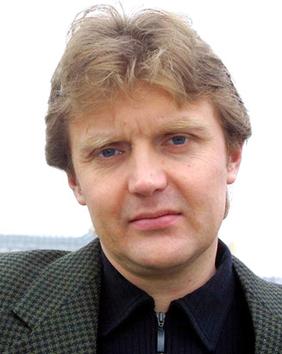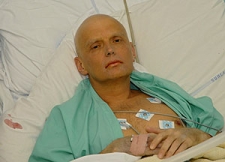Related Research Articles
Zurab Zhvania was a Georgian politician, who served as Prime Minister of Georgia and Speaker of the Parliament of Georgia.

The Federal Security Service of the Russian Federation is the principal security agency of Russia and the main successor agency to the Soviet Union's KGB; its immediate predecessor was the Federal Counterintelligence Service (FSK) which was reorganized into the FSB in 1995. The three major structural successor components of the former KGB that remain administratively independent of the FSB are the Foreign Intelligence Service (SVR), the Federal Protective Service (FSO), and the Main Directorate of Special Programs of the President of the Russian Federation (GUSP).

The Foreign Intelligence Service of the Russian Federation or SVR RF is Russia's external intelligence agency, focusing mainly on civilian affairs. The SVR RF succeeded the First Chief Directorate (PGU) of the KGB in December 1991. The SVR has its headquarters in the Yasenevo District of Moscow.

Active measures is a term used to describe political warfare conducted by the Soviet Union and the Russian Federation. The term, which dates back the 1920s, includes operations such as espionage, propaganda, sabotage and assassination, based on foreign policy objectives of the Soviet and Russian governments. Active measures have continued to be used by the administration of Vladimir Putin.
Oleg Danilovich Kalugin is a former KGB general. He was during a time, head of KGB political operations in the United States and later a critic of the agency. After being convicted of spying for the West in absentia during a trial in Moscow, he remained in the US and was sworn in as a citizen on 4 August 2003.

Nikolai Platonovich Patrushev is a Russian politician, security officer and intelligence officer who has served as the secretary of the Security Council of Russia since 2008. He previously served as the director of the Federal Security Service (FSB) from 1999 to 2008. Belonging to the siloviki faction of president Vladimir Putin's inner circle, Patrushev is believed to be one of the closest advisors to Putin and a leading figure behind Russia's national security affairs. He played a key role in the decisions to invade Crimea in 2014, Syria in 2015, and Ukraine again in 2022. He is considered as very hawkish towards the West and the US, and has promoted various conspiracy theories. Patrushev is seen by some observers as one of the likeliest candidates for succeeding Putin.

Chekism is a term to describe the situation in the Soviet Union where the secret police strongly controlled all spheres of society. It is also used by critics of the current Kremlin authorities to describe the power enjoyed by law-enforcement agencies in contemporary Russia.
Yuri Borysovych Shvets is a former Soviet intelligence officer of Ukrainian origin. He was a Major in the KGB between 1980 and 1990. From April 1985 to 1987, he was a resident spy in Washington, D.C. While there, he held a cover job as a correspondent for TASS, a Soviet state-owned news agency.

Alexander Valterovich "Sasha" Litvinenko was a British-naturalised Russian defector and former officer of the Russian Federal Security Service (FSB) who specialised in tackling organised crime. A prominent critic of Russian President Vladimir Putin, he advised British intelligence and coined the term "mafia state".

Yuri Petrovich Shchekochikhin was a Soviet and later Russian investigative journalist, writer, and liberal lawmaker in the Russian parliament. Shchekochikhin wrote and campaigned against the influence of organized crime and corruption. His last non-fiction book, Slaves of the KGB, was about people who worked as KGB informers.
Anatoly Vasilyevich Trofimov was a head of the Soviet KGB investigation department. He personally supervised all Soviet dissident cases including Sergei Kovalyov, Gleb Yakunin, Alexey Smirnov, and Yuri Orlov. He was later a deputy director of the Russian Federal Security Service and became a mentor and supervisor of Alexander Litvinenko. He was assassinated in April 2005 by unidentified gunmen in Moscow.

Alexander Litvinenko was an officer of the Russian Federal Security Service (FSB) and its predecessor, the KGB, until he left the service and fled the country.

Lubyanka Criminal Group is a book by Alexander Litvinenko about the alleged transformation of the Russian Security Services into a criminal and terrorist organization.
The poison laboratory of the Soviet secret services, alternatively known as Laboratory 1, Laboratory 12, and Kamera, was a covert research-and-development facility of the Soviet secret police agencies. Prior to the dissolution of the Soviet Union, the laboratory manufactured and tested poisons and was reportedly reactivated by the Russian government in the late 1990s.
Death of a Dissident: The Poisoning of Alexander Litvinenko and the Return of the KGB is a book written by Alexander Goldfarb and Marina Litvinenko about the life and death of her husband, former FSB officer Alexander Litvinenko who was poisoned by the radioactive element polonium in London in November 2006.
Konstantin Georgiyevich Preobrazhenskiy is a former KGB lieutenant colonel, an intelligence expert and the author of several books and numerous articles about Russian secret police organizations.

The active reserve of the KGB are members of the organization who work undercover "either pretending to assume various jobs or using as cover professions in which they are actually trained". Active reserve KGB officers typically occupied such positions as deputy directors of scientific research or deans responsible for foreign relations in academic institutions of the Soviet Union, although these people were not scientists. Other officers were trained for certain civilian jobs, usually translators, journalists, telephone engineers, or doormen in hotels that served foreigners.

Counterintelligence state is a state where the state security service penetrates and permeates all societal institutions, including the military. The term has been applied by historians and political commentators to the former Soviet Union, the former German Democratic Republic, Cuba after the 1959 revolution, Iraq under Saddam Hussein, China under the Chinese Communist Party (CCP), and post-Soviet Russia under Vladimir Putin, especially since 2012.
Russian espionage in the United States has occurred since at least the Cold War, and likely well before. According to the United States government, by 2007 it had reached Cold War levels.

The Plot to Hack America: How Putin's Cyberspies and WikiLeaks Tried to Steal the 2016 Election is a non-fiction book by Malcolm Nance about the Russian interference in the 2016 United States elections. It was published in paperback, audiobook, and e-book formats in 2016 by Skyhorse Publishing. A second edition was also published the same year, and a third edition in 2017. Nance researched Russian intelligence, working as a Russian interpreter and studying KGB history.
References
- 1 2 "Still Spying After All These Years", Time Magazine , June 29, 1992
- 1 2 Joyal's biography at National Strategies Inc.
- ↑ "Lawmakers put domestic spy agency on their agenda", Martin Kady II, Congressional Quarterly Daily Monitor, October 15, 2002
- ↑ "Terrorism in Moscow", PBS The NewsHour with Jim Lehrer , October 24, 2002
- ↑ "Singling out Arab-Americans", Washington Post January 21st 1991 (cited via the Congressional Record)
- 1 2 "Expert on Soviet Intelligence Shot in Adelphi", The Washington Post , March 3, 2007
- ↑ 501 c3 filing of the E Shevardnadze Foundation for Democracy and Security http://www.taxexemptworld.com/organization.asp?tn=299688, taxexemptworld.com
- ↑ Text of Joyal's speech at Zhvania's memorial service Archived 2007-09-27 at the Wayback Machine
- ↑ "Who killed Alexander Litvinenko?", Dateline NBC
- ↑ "Russian Intelligence Expert Shot", NBC4
- ↑ "Intelligence Specialist's Shooting Stirs Speculation", Washington Post, 4th March 2007
- ↑ Attack on Kremlin Critic in D.C. Suburb Still Unsolved One Year Later Archived 2008-02-20 at the Wayback Machine , By Jeff Stein, CQ National Security Editor, Feb. 15, 2008